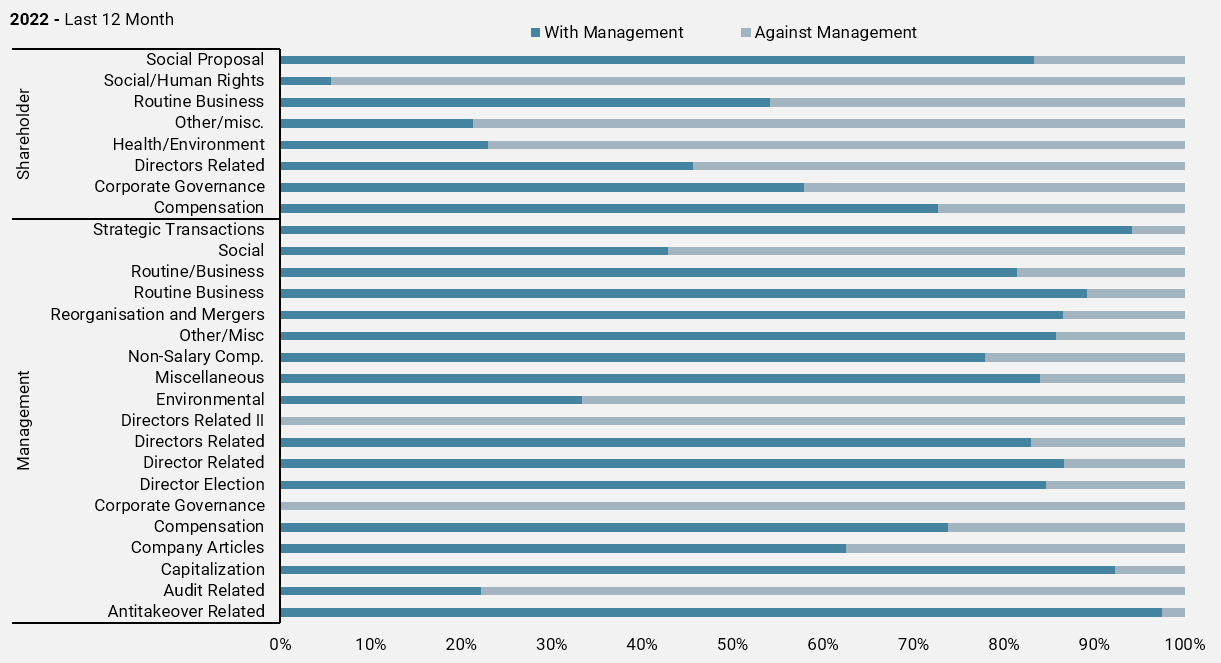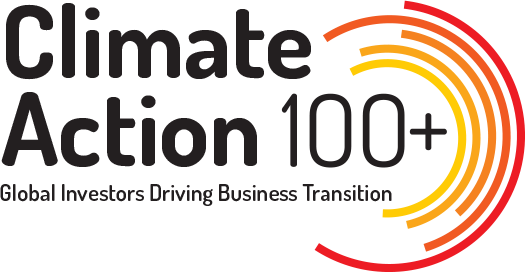Active Ownership
Proxy Voting
We believe in the importance of being an active shareholder. As such, we exercise the voting rights of our clients through an outsourced arrangement with ISS, a third-party proxy voting specialist. Unigestion’s proxy voting is based on a customised policy built upon ISS’ International Sustainable Proxy Voting policy which includes enhancements to address stricter rules for director and auditor independence, as well as the incorporation of ISS’ Climate Voting Services, which uses their Climate Scorecard.
During 2022, Unigestion voted at 98.12% of meetings. We voted against management on 18.64% of the 9,657 votes cast. Of those votes against management, we sided with the majority of Shareholder Proposals in areas of Health and the Environment, Human Rights and Social issues.
98.12%
Unigestion votes
9,657
Items voted
2022

Source: Unigestion
Direct Engagement
Engagement candidates are selected, based on financial materiality, issues emerging from the AGM, significant controversies, quantitative ESG analysis or qualitative ESG or SDG matters identified by the analysts.

Through our direct engagements with the firms we own we can voice our concerns with management while helping them identify and address important ESG risks. This is very much in keeping with our investment DNA.

We have four engagement catalysts:
I. AGM-based Engagements
We engage with portfolio companies on a variety of issues of most relevance to investors:
- Environmental subjects
- Climate change
- Human rights
- Labour rights
- Public health & safety
- Business ethics
- Corporate governance
II. ESG or Controversy Engagements
Within the framework of our ESG integration process, we have defined and incorporated monitoring rules to identify those listed companies which we hold in portfolios involved in significant incidents which may negatively impact stakeholders, the environment or the company’s operations, commonly known as controversies.
III. Thematic Engagement
The responsibility of companies with respect to Sustainable Development Goals (SDGs) is part of a qualitative research performed by the analysts. For a couple of years now, SDG13 – Climate Action, has been an overriding theme to consider for all of our engagement. As such, we will reach out directly and collaboratively to both publicly listed and privately held investee companies on issuers such as their Net Zero and Paris Agreement commitments, and carbon footprints.
IV. Client Specific Requests or Certain Requirements
Finally, certain clients and portfolios require specific engagements in order to meet their stewardship objectives. Also, for some of our funds which have SRI label, we have predefined certain objectives which may require specific engagements over time.
Nestlé
We continued our multi-year direct engagement with Nestlé which is a major holding in a number of our portfolios. We initially voiced our concerns in 2020 about the situation the company is facing in terms of social supply chain incidents. We understand that the company has developed programmes to address human rights issues in its supply chain, however, our research shows that the company continues to face persistent labour and human rights issues in its suppliers’ palm oil and cocoa plantations, including child labour cases.
We then participated in a session coordinated by the UN Global Compact in October 2021 that delved into the child labour situation within the agricultural supply chain with a particular focus on cocoa and coffee. It is estimated that there are over 1.5 million child labourers in cocoa in Cote d’Ivoire and Ghana alone. By 2020, industry backed child protection systems were estimated to cover 25% of the cocoa supply chain in Cote d’Ivoire and Ghana. Nestlé works with the communities to break the cycle of child labour through their Child Labour Monitoring and Remediation System.
On 12 November 2021 we met again with Darrel High, Global Cocoa Plan Manager for Nestlé. On the topic of child labour, Darrell explained the Cocoa Plan Project and how it is helping children toward a better life, and trying to reach the expected success rate. We asked what does the status ‘extended’ mean in their progress reports. They explained that they decided to extend deadlines for some goals that were not met in 2020, so in order to come up with new and realistic projects, these projects were extended to have more effective and impactful results. We will watch closely for any additional ‘extensions’ as a potential red flag. The primary KPI agreed upon is to have 95% of cocoa sourced from the Nestlé Cocoa Plan by 2025, while they sat at 46.5% at the close of 2020, with little improvement noted over the past three years. We agreed to discuss their progress at the next release of their Cocoa Plan Report.
Collaborative Engagement
Together with a further 700 signatories representing USD 68 trillion of investments, we are participating in the Climate Action 100+ initiative. This five-year project by both asset managers and asset owners aims to engage with 166 of the world’s largest corporate greenhouse gas emitters to curb emissions, strengthen climate-related financial disclosures and improve governance on climate change. To further deepen our commitment to this initiative, Unigestion became a lead on the engagement with Canadian oil and natural gas production and distribution company; Enbridge. We have had numerous conference calls with their CEO and their Head of Sustainability and participated in their ESG Forum. We applaud the Net Zero GHG commitment for 2050 but have requested more visibility on the glide-path. We continue to question their capex on natural gas facilities and we have pushed for enhanced focus on renewables.
In 2020, we joined the Plastic Solutions Investor Alliance, an international coalition of over 45 investors that engages with publicly traded consumer goods companies on the threat posed by plastic waste and pollution. This is a crucial initiative as, at current patterns, by 2050 there will be more plastics by weight in the oceans than fish. In this context, our first engagement was with The Coca-Cola Company. We spoke about problematic package design, such as their Capri-Sun plastic and foil laminate sachets that cannot be recycled, setting targets for plastic reduction, encouraging refillables, as well as their willingness to pay a premium for recycled plastic vs. virgin feedstock. Coke agreed to a goal of 50% recycled content by 2030.
We made a submission to the US Securities and Exchange Commission (SEC) regarding which extra-financial considerations should be made in corporate Annual Reports. We advocated strongly for the adoption of the TCFD framework as the one universally accepted benchmark.


